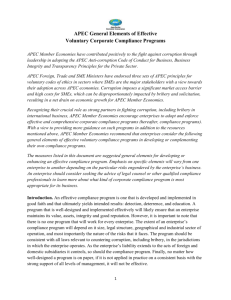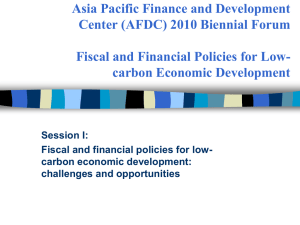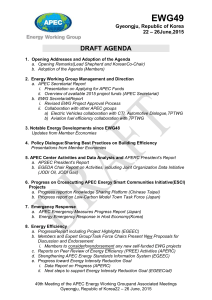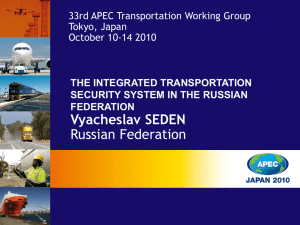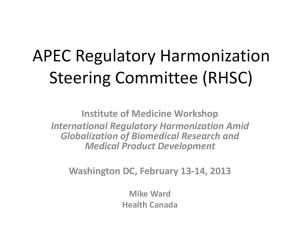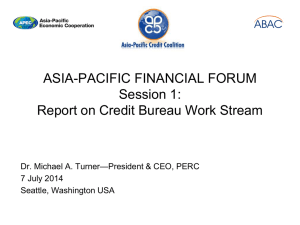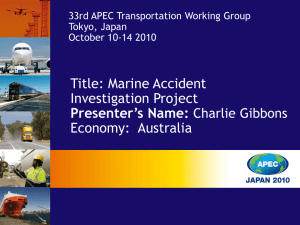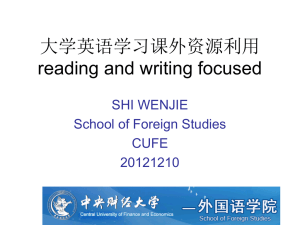APEC ACT Principles on Enforcement (49.51 KB, docx)
advertisement
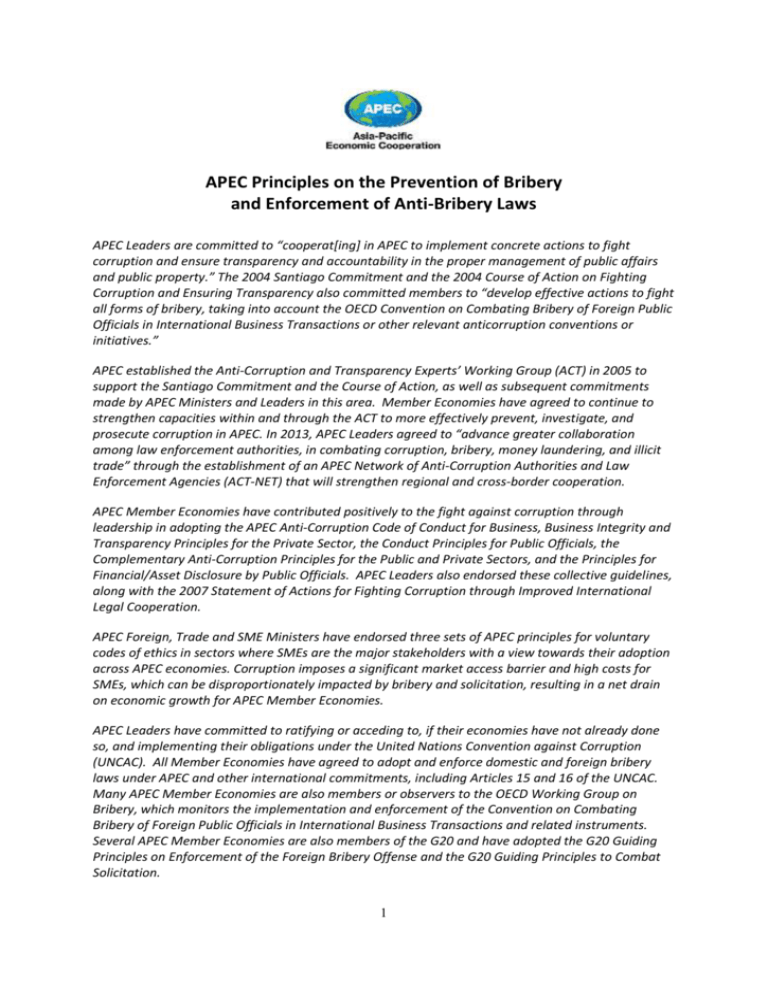
APEC Principles on the Prevention of Bribery and Enforcement of Anti-Bribery Laws APEC Leaders are committed to “cooperat[ing] in APEC to implement concrete actions to fight corruption and ensure transparency and accountability in the proper management of public affairs and public property.” The 2004 Santiago Commitment and the 2004 Course of Action on Fighting Corruption and Ensuring Transparency also committed members to “develop effective actions to fight all forms of bribery, taking into account the OECD Convention on Combating Bribery of Foreign Public Officials in International Business Transactions or other relevant anticorruption conventions or initiatives.” APEC established the Anti-Corruption and Transparency Experts’ Working Group (ACT) in 2005 to support the Santiago Commitment and the Course of Action, as well as subsequent commitments made by APEC Ministers and Leaders in this area. Member Economies have agreed to continue to strengthen capacities within and through the ACT to more effectively prevent, investigate, and prosecute corruption in APEC. In 2013, APEC Leaders agreed to “advance greater collaboration among law enforcement authorities, in combating corruption, bribery, money laundering, and illicit trade” through the establishment of an APEC Network of Anti-Corruption Authorities and Law Enforcement Agencies (ACT-NET) that will strengthen regional and cross-border cooperation. APEC Member Economies have contributed positively to the fight against corruption through leadership in adopting the APEC Anti-Corruption Code of Conduct for Business, Business Integrity and Transparency Principles for the Private Sector, the Conduct Principles for Public Officials, the Complementary Anti-Corruption Principles for the Public and Private Sectors, and the Principles for Financial/Asset Disclosure by Public Officials. APEC Leaders also endorsed these collective guidelines, along with the 2007 Statement of Actions for Fighting Corruption through Improved International Legal Cooperation. APEC Foreign, Trade and SME Ministers have endorsed three sets of APEC principles for voluntary codes of ethics in sectors where SMEs are the major stakeholders with a view towards their adoption across APEC economies. Corruption imposes a significant market access barrier and high costs for SMEs, which can be disproportionately impacted by bribery and solicitation, resulting in a net drain on economic growth for APEC Member Economies. APEC Leaders have committed to ratifying or acceding to, if their economies have not already done so, and implementing their obligations under the United Nations Convention against Corruption (UNCAC). All Member Economies have agreed to adopt and enforce domestic and foreign bribery laws under APEC and other international commitments, including Articles 15 and 16 of the UNCAC. Many APEC Member Economies are also members or observers to the OECD Working Group on Bribery, which monitors the implementation and enforcement of the Convention on Combating Bribery of Foreign Public Officials in International Business Transactions and related instruments. Several APEC Member Economies are also members of the G20 and have adopted the G20 Guiding Principles on Enforcement of the Foreign Bribery Offense and the G20 Guiding Principles to Combat Solicitation. 1 The APEC Business Advisory Council (ABAC) has called for, and supported, action by APEC Member Economies to eliminate corruption as a significant market access barrier, including efforts to increase enforcement. Corruption, including bribery, is a barrier to economic growth, as well as trade and investment, harming overall competitiveness in the region. By working together, APEC Member Economies and the private sector can make a difference in fighting corruption and eliminating its costs to our economies and our companies, thereby helping to create a culture of integrity and shared prosperity throughout the Asia-Pacific region and the world. Given that APEC’s 21 Member Economies account for more than half of global GDP, close to half of world trade, and constitute a market of 2.7 billion consumers, APEC principles on the prevention of bribery and enforcement of anti-bribery laws will benefit APEC economies and consumers across the Asia-Pacific region. Implementation of such principles would also support the goal of further promoting regional economic integration by taking, as stated in the 2010 Yokohama Declaration, “concrete steps toward realization of a Free Trade Area of the Asia-Pacific (FTAAP),” including “by playing a critical role in defining, shaping, and addressing the ‘next generation’ trade and investment issues that FTAAP should contain” and “work[ing] to address non-tariff barriers to trade.” Accordingly, in order to prevent bribery and enhance the enforcement of their laws addressing domestic and foreign bribery in compliance with their respective international commitments, and consistent with the APEC Course of Action on Fighting Corruption and Ensuring Transparency, APEC Member Economies further commit to the following, in accordance with the fundamental principles of each economy’s legal system: A Robust Legislative Framework 1. Consistent with their respective existing commitments in applicable global instruments such as the United Nations Convention Against Corruption, the Convention on Combating Bribery of Foreign Public Officials in International Business Transactions, and other relevant anti-corruption frameworks, APEC Member Economies should have a robust legislative framework that provides, in particular, for: i) clear and explicit criminal offenses on domestic and foreign bribery of public officials that cover key elements of such offenses, including the intentional promising, offering or giving, to a public official or a foreign public official, directly or indirectly, of an undue advantage, for the official himself or herself or another person or entity; and, the intentional solicitation or acceptance by the public official, directly or indirectly, of an undue advantage, for the official himself or herself or another person or entity; ii) where statutes of limitations exist, sufficient time to allow for investigation and prosecution of such offences and the recovery of the proceeds of corruption; iii) broad jurisdiction over such offences, including jurisdiction over an offence committed by a national of a Member Economy, in conformity with a Member Economy’s legal system; and iv) effective, proportionate, and dissuasive criminal and other sanctions for natural and legal persons; or, if criminal responsibility is not applicable to legal persons under a Member Economy’s legal system, effective, proportionate and dissuasive non-criminal sanctions in conformity with the Member Economy’s legal system. 2 Effective Prevention, Detection, and Domestic Coordination 2. Authorities of APEC Member Economies should be proactive in preventing and detecting domestic and foreign bribery offenses, ensuring that credible allegations of bribery of domestic and foreign officials, including solicitation by domestic officials, are referred in a timely fashion to law enforcement authorities responsible for investigating and prosecuting such crimes. 3. APEC Member Economies should provide outreach and training to raise the awareness of both public officials and the general public of domestic and foreign bribery and solicitation laws, and international instruments to which Member Economies are parties, with a view to stopping bribery and the solicitation and acceptance of bribes in APEC economies. 4. APEC Member Economies should encourage and facilitate efficient coordination and information sharing among the various authorities of each APEC Member Economy responsible for the detection, investigation, and prosecution of domestic and foreign bribery and related economic and financial crimes, in accordance with a Member Economy’s legal system. These authorities could include tax, financial intelligence units, money laundering, sanctions, and securities and other regulators, as well as investigators and prosecutors. 5. APEC Member Economies should ensure and promote coordination among relevant agencies such as overseas missions, broader tax administrations, trade promotion, public procurement, and export credit agencies, as well as engagement with the private sector, to raise the level of awareness; educate companies involved in international business transactions; and improve the possibilities for detection and reporting of corruption, including domestic and foreign bribery offences and related financial crimes. 6. APEC Member Economies should provide appropriate channels for reporting, including anonymously, allegations of acts of corruption, including bribery, and provide protection of whistleblowers in both the private and public sectors, in conformity with a Member Economy’s legal system. Effective Investigation and Prosecution 7. Law enforcement authorities of APEC Member Economies should be proactive in effectively investigating and prosecuting credible allegations of bribery of domestic and foreign public officials, including acts of solicitation by domestic officials, and recovering the proceeds of such crimes whenever possible. 8. APEC Member Economies should provide adequate resources to law enforcement authorities to proactively and effectively investigate and prosecute bribery of domestic and foreign public officials, including the solicitation of bribes by domestic officials, and to identify and recover the proceeds of such offenses, including, where possible, through non-conviction based proceedings. 9. Law enforcement authorities of APEC Member Economies dedicated to the investigation and prosecution of domestic and foreign bribery should have the necessary powers and political independence to carry out their functions effectively and without undue interference. Investigation and prosecution of domestic and foreign bribery should not be subject to improper influence based on concerns of the national economic interest, the potential effect upon relations with another State, or the identity of the natural or legal person involved. 10. Law enforcement authorities of APEC Member Economies should have adequate investigative powers, including access to information from financial institutions, to proactively and effectively 3 investigate and prosecute domestic and foreign bribery and to recover the proceeds of such offenses. Law enforcement authorities should also receive specialized training on detecting, investigating, and prosecuting domestic and foreign bribery, and pursuing related financial investigations and asset recovery efforts. Effective Asset Recovery and International Cooperation 11. APEC Member Economies should develop and institute robust systems to recover the proceeds of corruption offenses, including domestic and foreign bribery offenses. To this end, APEC Member Economies should promote international cooperation in this area by including the following measures in their legislative frameworks, in conformity with a Member Economy’s legal system: (i) adequate mechanisms to identify and prevent transfers of the proceeds of corruption through financial systems; (ii) measures permitting the timely identification of illicitly acquired assets; (iii) measures permitting the timely freezing and/or seizure, and confiscation, including, where possible and appropriate, measures providing for obtaining orders for freezing on an ex parte basis and measures permitting the recovery of the proceeds of corruption through non-conviction based proceedings; (iv) measures permitting the registration or enforcement of foreign orders consistent with the requirements of UNCAC; (v) measures facilitating international cooperation, including measures providing for the use of UNCAC as a sufficient basis for mutual legal assistance; and (vi) measures permitting the transfer of confiscated property between economies, where possible and appropriate. 12. APEC Member Economies should take measures to encourage and facilitate the exchange of information among competent authorities of Member Economies and authorities of other countries responsible for investigating and prosecuting domestic and foreign bribery offenses and related economic and financial crimes. 13. Contact between and among law enforcement authorities responsible for investigating and prosecuting bribery offenses is often an important and critical step before mutual legal assistance. Such contacts should be encouraged to the extent possible, in conformity with a Member Economy’s legal system. Further, APEC Member Economies should have clear procedures in place for mutual legal assistance. APEC Member Economies should, to the fullest extent possible under their laws and relevant treaties and arrangements, provide prompt and effective processing of both outgoing and incoming mutual legal assistance requests. The timely execution of mutual legal assistance is critical to successful investigations and prosecutions, particularly when dealing with offences which have a statute of limitations. 14. In case of multiple jurisdictions over the same alleged acts of foreign bribery, the relevant jurisdictions should consider consultations, when appropriate, during the investigation, prosecution and sanctioning phases of the case, in conformity with the legal systems of the relevant economies. The relevant jurisdictions should consider coordination as early in the process as is feasible and where appropriate. 4
